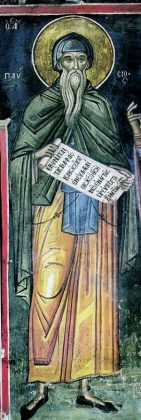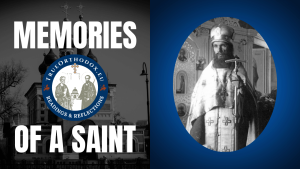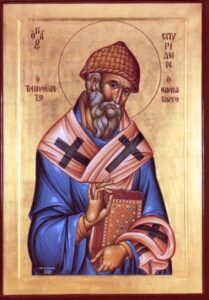Our Father Among the Saints Paisius the Great of Egypt

Source: iconandlight
Commemorated June 19
Verses
I call you an Angel O Paisios,
Not by nature but by your unusual life.
Our Venerable and God-bearing Father Paisios the Great was from the village of Shansa in Egypt and born in 320. His parents were Christians, that distributed generous alms to all the needy. Younger to six other brothers, he was weak and frail. After the death of her husband, his mother saw an angel in a vision saying to her: “The Lord says to you, give Me one of your children to serve Me.” She answered: “Lord, take whoever you want.” The angel took the hand of Paisios, who was thin and his body was frail. His mother told the angel, “My Lord, take one who is strong to serve the Lord.” “This is whom the Lord has chosen,” the angel replied.
At the age of twenty, Paisios went to the wilderness of Scetes and became a monk by the hand of Abba Pambo (July 18), who also ordained Abba John the Dwarf, the future biographer of Saint Paisios. Renouncing his will, Paisios lived under the spiritual guidance of Abba Pambo, finishing all the tasks assigned him with humility and obedience. The Elder said that a new monk, in particular, needs to preserve his sight, in order to guard his senses from temptation. Paisios, heeding the instruction, went for three years with his eyes cast downwards. He also came to understand the great value of fasting in the spiritual life. At first, he did not eat any food for a week, then two weeks. Sometimes, after partaking of the Holy Mysteries of Christ, he survived without food for seventy days.
When Abba Pambo died, Paisios went into the Nitrian desert in search of solitude.
When Abba Pambo left the world to go to Christ, St. Paisios lived for a time in the same cell at Scetis (now Wadi El-Natroun) with St. John the Dwarf. An angel appeared to them later to tell them that St. Paisios should go to the desert and establish a monastery there. Paisios went into the Nitrian desert. There he lived in a cave carved out by his own hands. The Saint was granted a wondrous vision: the Lord Jesus Christ appeared and said to Paisios: “Do you see this desert which is boundless? One day I will fill it through you with monks who will glorify My name”. He asked the Lord where the monks would obtain the necessities of life in the desert. The Lord said that if they would fulfill all His commandments, He Himself would provide all their necessities, and would deliver them from demonic temptations and cunning.
Paisios was guided by an angel to the site of the present Monastery of Saint Paisios (Pishoy), where he lived the life of a hermit. At this time, he became the spiritual father of many monks who gathered around him. He was famous for his love, wisdom, simplicity, and kindness, as well as for his extremely ascetic life. He was also known to love seclusion and quietness. Paisios’s asceticism was harsh to the extent of tying his hair and hands with a rope to the ceiling of his cell, in order to resist sleeping during his night prayers. This asceticism made him so famous that he was visited by Saint Ephraim the Syrian. In time a monastery was established. The most important rule of Abba Paisios was that no one would do anything by his own will, but in all things would fulfill the will of his elders.
It is believed Paisios saw the Lord Jesus a number of times. Once, an old monk asked him to help him climb a mountain, so Paisios carried him on his shoulders and climbed, only to discover that the old monk was no one but the Lord Himself. The latter told him that, for the extent of his love, his body will not see corruption.
Saint Paisios was also said to have seen Christ at his monastery. When Paisios’s brethren learned that our Lord Jesus Christ was coming, they gathered so that they might see Him. Earlier, there had been an old man that asked these monks to help him on his way but they ignored him. When Saint Paisios saw the old man, he helped him back to his room. He customarily washed the old man’s feet. The old man then appeared to him as our Lord Jesus.
Emperor Constantine and the Prophet Jeremiah appeared to him in visions. In one of those visions, Emperor Constantine said: “Had I known how great is the honor of monks, I would have abandoned my kingdom and became a monk. “
Paisios told him: “You have banished the heathen worship and exalted Christianity, and has not Christ given you anything?’
Emperor Constantine answered him: “The Lord has given me many gifts, but none of them is like the honor of the monks’’ I saw the souls of some Monks who had been separated from the body and flew as eagles, and with great daring rise to the heavens. And the rank of demons did not dare approach them at all. Then I saw that the gates of heaven were opened for them, and they entered in, and appeared before the heavenly King, standing with great boldness before the throne of God. For this reason, therefore, I am amazed by you Monks, and I bless you, and I condemn myself for not being made worthy of boldness like this. For I wish that I could have left my passing kingdom, and the royal robe and crown, and to become poor, and to wear sackcloth, and to accept all those things that the monastic life seeks.’
Saint Paisios distinguished himself by his great humility and performed ascetic deeds of fasting and prayer, but he concealed them from others as far as possible. When the monks asked which virtue is the highest of all, the Saint replied, ‘’Those which are done in secret, and about which no one knows’’.
In 407/408 AD, as the Barbers invaded the wilderness of Scetes, Paisios left and dwelt in the mountain of Ansena. At this time, he met saint Paul of Thmuis (Tammah) in Antinopolis and the two became very close friends. While at the mountain of Ansena, Paisios built another monastery, known today as the Monastery of Saint Pishoy at Dayr al-Barsha , which still stands today near Mallawi.
Saint Paisios reposed in peace in 417.
After some time his relics were transferred by Saint Isidore of Pelusium (February 4) to his own monastery and placed beside the relics of his friend Saint Paul of Thmoui. When they wanted to move the body of St. Paisios to the wilderness of St. Macarius in Scete, they carried it onto a boat and left St. Paul’s body behind; however, the boat would not move, until they brought the body of St. Paul and placed it beside St. Paisios’s body. Then they brought them to the wilderness of Scete. Today the two bodies lie in the main church of the Coptic monastery of Saint Paisios in the Nitrian Desert.
***
St. Seraphim of Sarov
And in what fashion to vanquish anger one may see from the Life of St. Paisius the Great (Lives of Saints, June 19), who asked the Lord Jesus Christ, Who had appeared to him, to free him from anger; and Christ said to him; If you wish to vanquish anger and rage together, desire nothing, neither hate anyone nor belittle anyone.
Apolytikion of Paisius the Great
Fourth Tone
The incarnate Angel, and the boast and summit of monks, the bodiless man, the citizen of Heaven, the great God-bearing Paisius celebrateth with us in divine jubilation, granting grace to all them that extol him with reverence. With fervour let us honour this day, offering him songs of praise.
Apolytikion of Apostle Jude
First Tone
We know thee as a kinsman of Christ and we laud thee with sacred hymns and songs as a most steadfast Martyr who trampled on error and who courageously kept the Faith. As we celebrate today thy holy remembrance, we receive forgiveness of our sins and transgressions, O Jude, through thy holy prayers.
Troparion of St. Paisius, Tone 4
The sublime monk and incarnate angel, the bodiless man, and citizen of heaven grants grace to all who honour him as today he celebrates with us. Let us fervently ascribe glory to him.
Kontakion of Paisius the Great
Plagal of the Fourth Tone
With godly anthems, come, ye faithful, let us all acclaim the godly-wise and truly venerable Paisius, the true citizen and ornament of the desert, the most noble peer of Angels, the true friend of Christ, and the glory of monastics and ascetic Saints. Let us cry to him: Rejoice, O Father Paisius.









